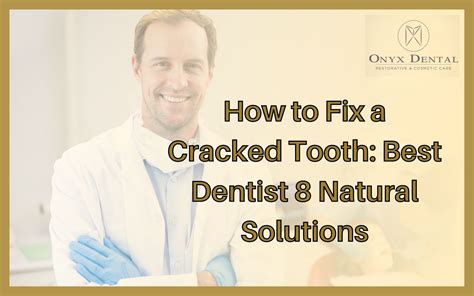Cracked Tooth Pain? Natural Solutions That Work
A cracked tooth can be excruciating. The sharp, shooting pain, often triggered by biting down or changes in temperature, can significantly disrupt your daily life. While a dentist is the ultimate authority for diagnosing and treating cracked teeth, exploring natural solutions to manage pain and inflammation while you await professional care can be incredibly helpful. This article explores several natural approaches to ease cracked tooth pain, emphasizing that these methods are supplementary and should not replace professional dental treatment.
What Causes Cracked Tooth Pain?
Understanding the root cause of your pain is crucial. Cracked teeth, ranging from minor hairline fractures (fractured cusp) to severe splits extending below the gum line (vertical root fracture), can stem from various factors:
- Bruxism (teeth grinding): This common sleep disorder puts immense pressure on teeth, leading to cracks.
- Trauma: Accidents, falls, or sports injuries can fracture teeth.
- Large fillings: Existing large fillings can weaken teeth, making them more susceptible to cracking.
- Dental decay: Extensive cavities weaken tooth structure, increasing fracture risk.
- Age-related wear and tear: Teeth naturally weaken over time, increasing vulnerability to cracks.
How Can I Tell if I Have a Cracked Tooth?
Identifying a cracked tooth can be tricky, as symptoms vary depending on the severity and location of the crack. Common indicators include:
- Sharp, shooting pains: Often triggered by biting down or chewing.
- Sensitivity to temperature: Hot or cold foods and drinks can cause intense pain.
- Lingering pain: Discomfort may persist even after the stimulus is removed.
- Pain when releasing pressure: The pain might lessen when you bite down but return when you release the bite.
- Visible cracks: Sometimes, a crack is visible to the naked eye, particularly if it’s on the biting surface of the tooth.
If you suspect a cracked tooth, seek professional dental care immediately.
Can I Use Natural Remedies for Cracked Tooth Pain?
Natural remedies can offer temporary pain relief and reduce inflammation, but they are not a cure for a cracked tooth. They should be used in conjunction with, and not as a replacement for, professional dental treatment.
1. Saltwater Rinse:
A simple saltwater rinse is a highly effective way to clean the affected area, reduce inflammation, and provide temporary pain relief. Mix 1/2 teaspoon of salt in a glass of warm water and swish gently around your mouth for 30-60 seconds before spitting it out. Repeat several times a day.
2. Clove Oil:
Clove oil has natural anesthetic and antiseptic properties. Applying a tiny drop directly to the affected tooth with a cotton swab can numb the area and reduce pain temporarily. Be cautious, as it can be irritating to the gums.
3. Peppermint Oil:
Like clove oil, peppermint oil possesses analgesic and anti-inflammatory effects. Dilute a few drops in a carrier oil (like coconut or olive oil) and gently massage the gumline near the cracked tooth.
4. Cold Compress:
Applying a cold compress to your cheek near the affected tooth can help numb the area and reduce swelling. Wrap ice cubes in a thin cloth and apply for 15-20 minutes at a time, several times a day.
5. Avoid Trigger Foods:
Identify foods and drinks that trigger your pain (e.g., hard candies, ice, extremely hot or cold beverages). Avoiding these triggers can minimize discomfort until you see your dentist.
6. Over-the-Counter Pain Relief:
Over-the-counter pain relievers like ibuprofen or acetaminophen can help manage pain until you can see your dentist. Always follow the recommended dosage on the packaging.
What Happens if a Cracked Tooth is Left Untreated?
Ignoring a cracked tooth can lead to several serious complications:
- Infection: Bacteria can enter the crack, leading to an abscess and severe pain.
- Tooth loss: The crack can worsen, ultimately leading to tooth loss.
- Abscess formation: This painful infection requires immediate professional attention.
- Jawbone damage: In severe cases, the infection can spread to the jawbone.
When Should I See a Dentist for a Cracked Tooth?
Any pain or discomfort related to a suspected cracked tooth warrants immediate professional attention. Delaying treatment can exacerbate the problem, leading to more extensive damage and more complex (and expensive) treatment options.
Can a Cracked Tooth Be Repaired?
Yes, depending on the severity of the crack and its location, several restorative treatments are available, including:
- Dental bonding: For minor cracks.
- Dental crown: For more significant cracks.
- Root canal treatment: If the crack extends into the pulp (the inner part of the tooth).
- Tooth extraction: In cases of severe damage where the tooth cannot be saved.
Remember, while natural remedies can offer temporary relief, they are not a substitute for professional dental care. Addressing a cracked tooth promptly minimizes the risk of complications and ensures the best possible outcome for your oral health.

